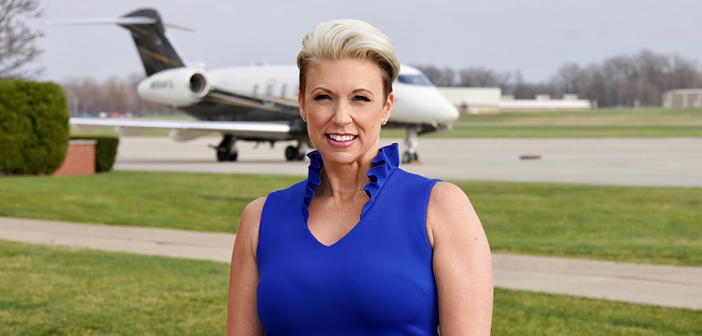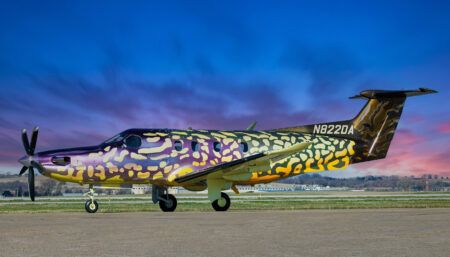Megan Wolf, chief operating officer at Flexjet, details the measures taken by the fractional jet operator to protect passengers and crew during the COVID-19 pandemic
How have you changed your cabin cleaning regime?
As we like to say, there’s clean, and then there’s protected – an enhanced level of sanitation that results in improved safety and reduced threats to health. Since the emergence of COVID-19, we have increased the level of cleaning through everything from the use of hospital-grade disinfectants to MicroShield 360, which kills 99.9% of pathogens, to Flex Wipes, which disinfect in flight without using surface-damaging bleach.
Have you implemented any additional cabin air technologies?
Unlike almost all commercial aircraft and some private jets, our aircraft use cabin air replacement instead of air recirculation. Each aircraft has a continuous exchange of clean, pressurised air that is constantly gathered from the sky outside. The air then is cooled, conditioned and continually introduced to the interior. Simultaneously, air is released from the interior so that the air is crisp, clean and un-recycled.
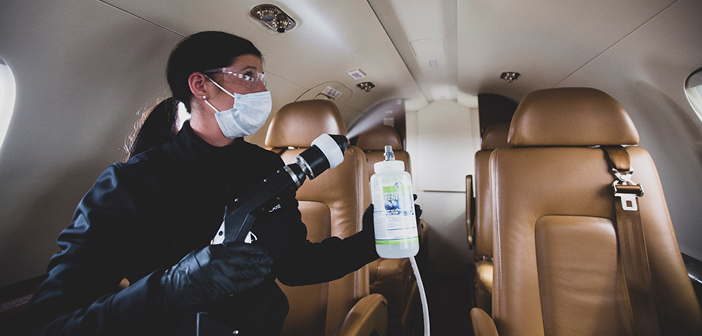
Have you implemented antimicrobial barrier surface treatments?
Even before COVID-19 was designated a pandemic, we began to have MicroShield 360, an antimicrobial barrier, professionally applied to our aircraft interiors, our offices and our facilities worldwide. Altogether, we have treated more than 160 aircraft.
MicroShield 360’s biostatic finish kills 99.9% of pathogens ranging from E. coli to the common cold and is proven to kill the coronavirus in lab studies. It is safe, clear, odourless, non-toxic and hypoallergenic. We use a three-step process to apply it, starting with cleaning using an EPA-approved hospital-grade disinfectant. Next, we perform an electrostatic fogging procedure to ensure the solution reaches every square inch of interior space. Finally, we apply MicroShield 360, which delivers continuous protection, so surfaces are self-disinfecting for up to a year.
What has been your approach with onboard crew and service?
We routinely test crew members with a PCR COVID-19 test prior to their tour; the testing is overseen by Vault Health, which handles nationwide testing for colleges, sports teams and other organisations that need to test people at different locations. It’s part of a revised set of cabin procedures designed by a hospital-affiliated centre for travel medicine, which regularly shares insights specific to minimising risk throughout Flexjet.
We have changed our onboard service, introducing three separate tiers differentiated by levels of contact to assuage passenger concerns. We also provide comprehensive training for our flight crews so they can deliver the highest levels of service consistent with each tier’s standards.
Passengers may request zero-contact service during which the presence of crew members is minimised, with few onboard amenities. For those who prefer a full-service approach, crew members wear custom-made facial coverings and sterile protective gloves while providing serving ware and catered food. The food may be served pre-packaged or placed directly into the aircraft galley. Flex Wipes, which disinfect without the use of surface-damaging bleach, are available. In either instance, we encourage passengers to use call buttons, to minimise traffic and maintain social distancing.
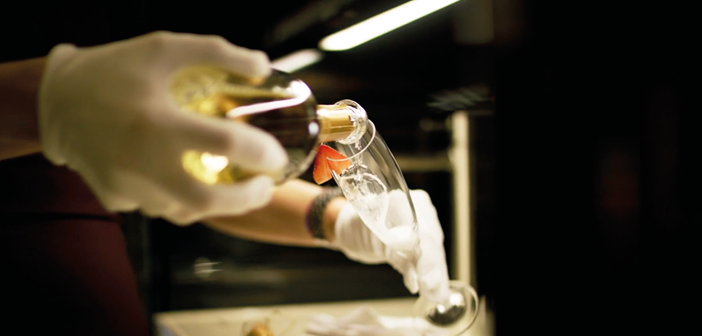
What other measures have you put in place, perhaps beyond the cabin?
We are committed to minimising the risk of coronavirus exposure and transmission. One of our most innovative steps is Project Lift, which we created in March 2020, during the pandemic’s earliest days.
Project Lift is our in-house crew ferry programme. It enables flight crews to reach their flight assignments using our own fleet rather than the airlines, letting them avoid commercial jets, terminals and lengthy check-in and security lines. By eliminating the potential exposure to the coronavirus associated with airline travel, we can better ensure the safety of our crew members and, accordingly, our passengers.
Project Lift moves more than 800 crew members based in more than three dozen cities to missions both within the USA and abroad. We make this happen by using nearly a dozen park-and-fly hubs strategically located across the USA. Crew members drive to a hub and are flown aboard Flexjet aircraft to their destinations. Since March 2020, we have dedicated more than 5,000 flights to Project Lift – an enormous commitment.
What have been your passengers’ concerns? What information have you needed to communicate to them?
Safety in the form of COVID-19 prevention has been our passengers’ biggest single concern for the past year. We seek to assuage these concerns through initiatives such as treating our aircraft and facilities with MicroShield 360, ferrying flight crews on our own aircraft and adopting enhanced onboard sanitation and contact-reduction strategies. We’ve communicated these to our owners and passengers, and that has given them the confidence to fly privately.
Will some of these measures be permanent fixtures beyond the pandemic?
Yes, definitely. Enhanced health measures will always be an asset, even after the COVID-19 pandemic is under control. Apart from the risk of future epidemics, COVID-19 has raised awareness of the health risks everyone runs – from colds to the seasonal flu to the norovirus. There will be long-term demand for improved sanitation and steps to ensure traveller health.
Are new hygiene requirements likely to influence your future cabin design decisions?
We’re always working with safety and healthcare professionals and aircraft manufacturers to identify best practices and improvements that can be made to our aircraft and operations. One of our highest priorities is determining how to minimise or eliminate the risk of pathogens, including the coronavirus. Much of our effort consists of proactive measures such as the MicroShield 360 application and Project Lift, but we’re also looking at technical innovations in aircraft design.
Have you seen many new clients? How much of this extra business do you think will be retained?
Yes, we have seen more first-time fliers, attracted by the fact that private jets minimise the opportunities for coronavirus exposure and because of reductions in airline schedules that make private jets the most efficient way to reach many destinations – sometimes the only way. We work closely with these clients so that they fully understand the value of the private jet experience; once they have flown privately, they find it’s difficult to go back to commercial travel.
What is your outlook for the year ahead?
We’re optimistic. In 2020, McKinsey found that more than 90% of those who can afford to fly privately did not. We believe there are real opportunities for growth and we are ready for it. The pandemic has inspired many people to consider private aviation, including many who might never have tried it under normal circumstances. This has been a source of optimism for us in what has been a challenging 12 months.
